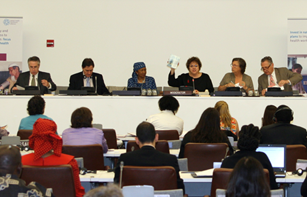
Credit: AMREF
If international aims such as achieving health-related Millennium Development Goals (MDGs) and universal access to HIV services are to be realized, the serious global shortage of health workers must be urgently addressed. This shortage has been severely exacerbated by the AIDS epidemic reducing staff numbers and significantly increasing the workload of those remaining.
At a side event during the High Level Meeting on AIDS in New York this week, the need to recognise human resources as a crucial element in the global AIDS response was explored in depth. Without sufficient human resources, countries' efforts to scale up comprehensive AIDS services will not be sustained, making it impossible to reach the MDGs.
The meeting, Can MDG 6 be achieved with the Health Workforce we have?, was jointly organized by the Global Health Workforce Alliance (GHWA), along with the Government of Brazil, the Commonwealth Secretariat, UNAIDS and the African Medical and Research Foundation (AMREF).
A lively panel discussion, including heads of state, senior representatives from donor and international organisations, civil society and the private sector, examined the interconnectivity of HIV and human resources and also shared best practices.
Joining discussants Mphu Ramatlapeng, both Global Fund Vice-chair and Lesotho’s Health Minister and Secretary Jarbas Barbosa, Brazil’s Secretary of Health Surveillance, were keynote speakers Dileita Mohamed Dileita, Prime Minister of Djibouti and Maxensia Nakibuuka, a Ugandan community health worker living with HIV. The session was moderated by Pulitzer prize-winning journalist Laurie Garrett, who is also Senior Global Health Fellow at the Council on Foreign Relations research centre.
Mr Dileita Mohamed Dileita highlighted the effects of an insufficient number of health workers, their uneven distribution, and limitations in their competencies in his own country, Djibouti. Dr Barbosa agreed that uneven distribution of staff is a major problem in Brazil.
Speaking as a community health worker Maxensia Nakibuuka from Uganda emphasized the difficulties she and her colleagues faced, “We are left to do it alone. Without system strengthening, without budgets; with nothing…We need to be recognized.”
According to Mphu Ramatlapeng, the Global Fund is helping countries meet their needs, with round 11 of Fund proposals including support for health workforce strengthening. She also stressed the crucial need for all stakeholders to work together.
The role of the private sector in offering support was examined. Michael Bzdak, Johnson & Johnson ‘s Director of Contributions and Community relations, spoke of their corporate social responsibility and building health care capacity, primarily in terms of leadership, management techniques and skills training.
Dr Sigrun Mogedal, former-Ambassador, HIV/AIDS and Global Health Initiatives, Norway, and former Chair of the GHWA board, commented on the need to “do things differently.” She referred to the recently released Alliance taskforce report Will we achieve universal access to HIV/AIDS services with the health workforce we have? A snapshot from five countries and stressed actions required by governments and other decision makers. These include: estimating numbers and types of health workers needed to reach international targets; strengthening health workforce management systems; implementing costed plans for increasing and improving the health workforce; and scaling up successful approaches.
Another important aspect raised was the need to focus considerable attention not only on workforce training but on staff retention strategies, looking at motivation and job satisfaction. This point was made by Dr John Palen, Senior HRH advisor of the US President’s Emergency Plan for AIDS Relief (PEPFAR).
The answer to the central question posed was a sobering one: if the impact of AIDS on health workers is not seriously addressed, the human resources crisis will worsen and MDG 6 will become almost impossible to attain. Although progress is being made, there are still many gaps and challenges to overcome.
A report of the meeting will be made available shortly.




